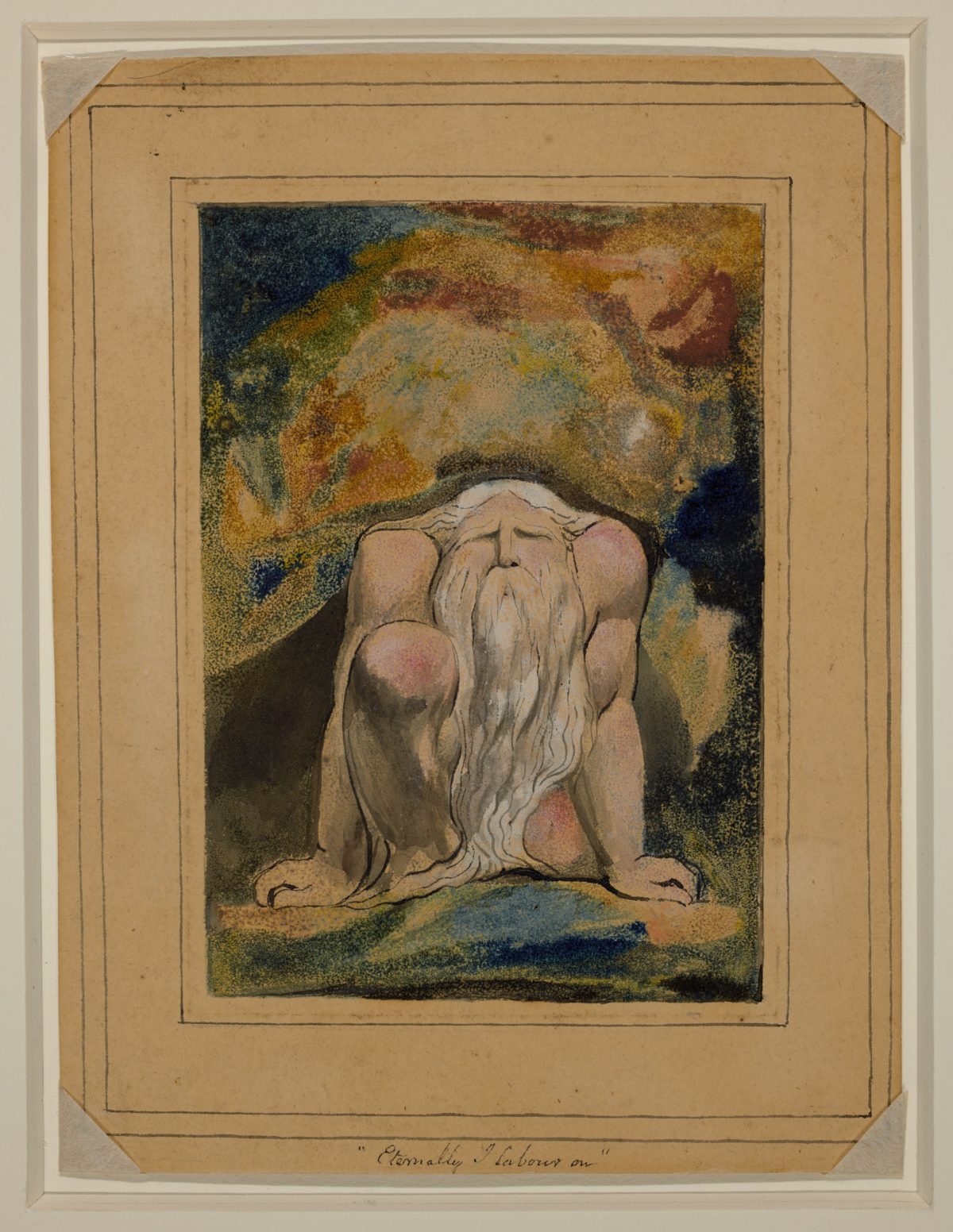 |
Princeton University Library
Book of Urizen
Plate 4 "Eternally I Labor On" |
To my surprise I learned that James Joyce had his imagination stimulated by the poetic imagery of William Blake. An exhibition at the Tate Gallery had this quote by Joyce attached to the introduction.
“Blake sang of the ideal world, of the truth of the intellect, and of the divinity of the imagination. … The only writer to have written songs for children with the soul of a child … he holds, in my view, a unique position because he unites intellectual sharpness with mystic sentiment.” Joyce
A lecture on William Blake, in Italian, was given March 1912 at the Università Popolare Triestina by James Joyce. The twenty page manuscript is in the Yale University Library.
The following passages are translations from Joyce's Lecture:
"It is a sad irony to think that this poet of childish innocence, the only writer who has written songs for children with the soul of a child, and who has illuminated the phenomenon of gestation with a light so tender and mystical in his [218] strange poem The Chrystal Cabinet, was destined never to see the sight of a real human child at his fireside. To him who had such great pity for everything that lives and suffers and rejoices in the illusions of the vegetable world, for the fly, the hare, the little chimney sweep, the robin, even for the flea, was denied any other fatherhood than the spiritual fatherhood, intensely natural though it is, that still lives in the lines of Proverbs: [11]
'He who mocks the Infant’s Faith
Shall be mock’d in Age & Death.
He who shall teach the Child to Doubt
The rotting Grave shall ne’er get out.
He who respects the Infant’s faith
Triumphs over Hell & Death.'"
***********
"One must be, in the first place, well-disposed to mysticism, and in the
second place, endowed with the patience of a saint in order to get an
idea of what Paracelsus and Behmen mean by their cosmic exposition of
the involution and evolution of mercury, salt, sulphur, body, soul and
spirit. Blake naturally belongs to another category, that of the
artists, and in this category he occupies, in my opinion, a unique
position, because he unites keenness of intellect with mystical feeling.
This first quality is almost completely lacking in mystical art. St.
John of the Cross, for example, one of the few idealist artists worthy
to stand with Blake, never reveals either an innate sense of form or a
coordinating force of the intellect in his book The Dark Night of the Soul, that cries and faints with such an ecstatic passion."
*************
"Michelangelo’s influence is felt in all of Blake’s work, and especially
in some passages of prose collected in the fragments, in which he always
insists on the importance of the pure, clean line that evokes and
creates the figure on the background of the uncreated void."
*************
"Armed with this two-edged sword, the art of Michelangelo and the revelations of Swedenborg, Blake killed the dragon of experience and natural wisdom, and, by minimizing space and time and denying the existence of memory and the senses, he tried to paint his works on the void of the divine bosom."
*************
"The mental process by which Blake arrives at the threshold of the
infinite is a similar process. Flying from the infinitely small to the
infinitely large, from a drop of blood to the universe of stars, his
soul is consumed by the rapidity of flight, and finds itself renewed and
winged and immortal on the edge of the dark ocean of God. And although
he based his art on such idealist premises, convinced that eternity was
in love with the products of time, the sons of God with the sons of […]"
Milton, Plate 24 [26], (E 121)
"Los is by mortals nam'd Time Enitharmon is nam'd Space
But they depict him bald & aged who is in eternal youth
All powerful and his locks flourish like the brows of morning
He is the Spirit of Prophecy the ever apparent Elias
Time is the mercy of Eternity; without Times swiftness
Which is the swiftest of all things: all were eternal torment:
All the Gods of the Kingdoms of Earth labour in Los's Halls.
Every one is a fallen Son of the Spirit of Prophecy
He is the Fourth Zoa, that stood arou[n]d the Throne Divine."The kinship which Joyce felt for Blake is evident in these few words:"That language was the same in which tonight I try, by your leave, in so far as I can, to recall his spirit from the twilight of the universal mind, to detain it for a minute and question it. He began to study Italian in order to read the Divina Commedia in the original and to illustrate Dante’s vision with mystical drawings," Joyce
TRACING BLAKE'S VISIONARY PROCESS IN JOYCE'S
A PORTRAIT OF THE ARTIST AS A YOUNG MAN
By HYE-YOUNG KIM
No comments:
Post a Comment